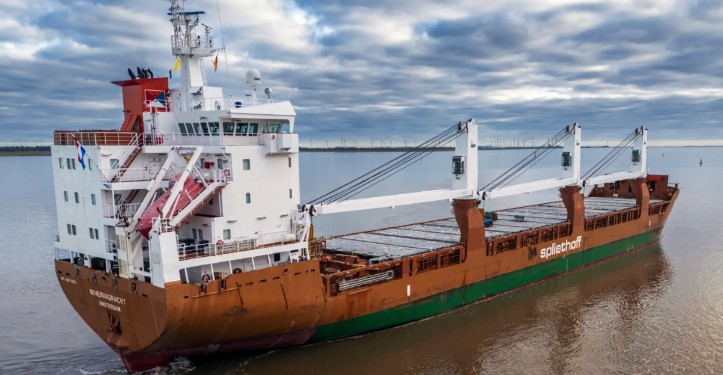A powerful missile strike set a Dutch-flagged cargo ship ablaze in the Gulf of Aden on Monday, creating a dangerous situation in one of the world’s busiest shipping lanes. The vessel, named Minervagracht, was attacked while moving through the strategic waterway. The missile caused major damage to the cargo ship, forcing all 19 crew members to abandon it. Two sailors were injured in the assault, with one needing urgent medical evacuation.
Attack on Cargo Ship in the Gulf of Aden
The Gulf of Aden is a vital sea route connecting the Arabian Sea with the Red Sea through the Bab el-Mandeb Strait. This narrow passage divides East Africa from the Arabian Peninsula, making it a choke point for global trade. Millions of tons of cargo pass through this region every year, but it has also become a hotspot for hostile attacks on commercial vessels.
Officials described the latest strike on the Minervagracht as one of the most severe attacks in the Gulf of Aden in recent times. Unlike earlier incidents that mostly took place in the Red Sea, this assault shows the threat has expanded into new areas of the Arabian Sea, raising alarms for the wider shipping industry.
💣 Red Sea flashpoint — Houthi missile attack triggers Israeli retaliation in Yemen
Crew Evacuation from the Burning Cargo Ship
As soon as the missile hit, the cargo ship caught fire and began drifting out of control. The crew sent out emergency signals, and rescue teams quickly launched operations. A helicopter evacuated all 19 sailors on board. The crew included members from several countries, including the Philippines, Russia, Sri Lanka, and Ukraine. One sailor sustained minor injuries and remained stable, while another suffered more severe wounds and medical teams flew him to Djibouti for specialized treatment.
The company that owns the Minervagracht confirmed that the missile strike caused “substantial damage” to the cargo ship. Witnesses saw thick black smoke rising into the sky after the explosion. European naval forces patrolling the region reported that the vessel continued burning and drifting even after the crew had evacuated.
Cash Cutoff! U.S. Freezes Yemen Bank Helping Rebel Army Bomb U.S. Forces
This was not the first time attackers targeted the cargo ship. On September 23, assailants attempted to strike the Minervagracht, but that attack failed to hit its mark. Unfortunately, this time the missile found its target, causing severe destruction and forcing a full-scale evacuation.
Escalation of Maritime Attacks
Armed groups operating from Yemen have claimed responsibility for more than a hundred attacks on commercial vessels in the past two years. The groups carried out these strikes using both missiles and drones. They say their actions link to the ongoing war in Gaza and claim they are showing support for the Palestinian side.
Investigators have found that many of the cargo ships the groups attacked had no links to Israel. International maritime officials confirmed that the Minervagracht had no connection to Israel. This situation highlights the growing risk for all ships passing through the region, regardless of their flag or ownership.
In July, the armed groups sank two vessels in the Red Sea, killing at least four crew members. They are believed to still hold survivors from those attacks. These events have increased fear among shipping companies, captains, and sailors who must navigate these waters.
Yemen’s Houthis announce Palestine-2 missile fired at Tel Aviv in unprecedented escalation
The repeated assaults on cargo ships and other vessels have also disrupted international trade flows. The Red Sea and the Gulf of Aden are among the world’s most critical maritime corridors. Before the conflict intensified, nearly $1 trillion worth of goods traveled through this route each year. Attacks on cargo ships have forced many companies to reroute their vessels, which leads to longer travel times, higher costs, and delays in delivery of goods.
Missile Strike Connection
Another notable pattern has been the delay in public claims of responsibility. The Houthis often wait hours or even days before announcing their involvement in attacks. While they have not officially claimed the strike on the Minervagracht yet, regional military monitoring centers have directly linked the attack to them.
The assault on the Dutch cargo ship highlights the expanding reach of these armed groups and the rising dangers faced by commercial shipping in one of the world’s most vital maritime zones.
